A doksi online olvasásához kérlek jelentkezz be!
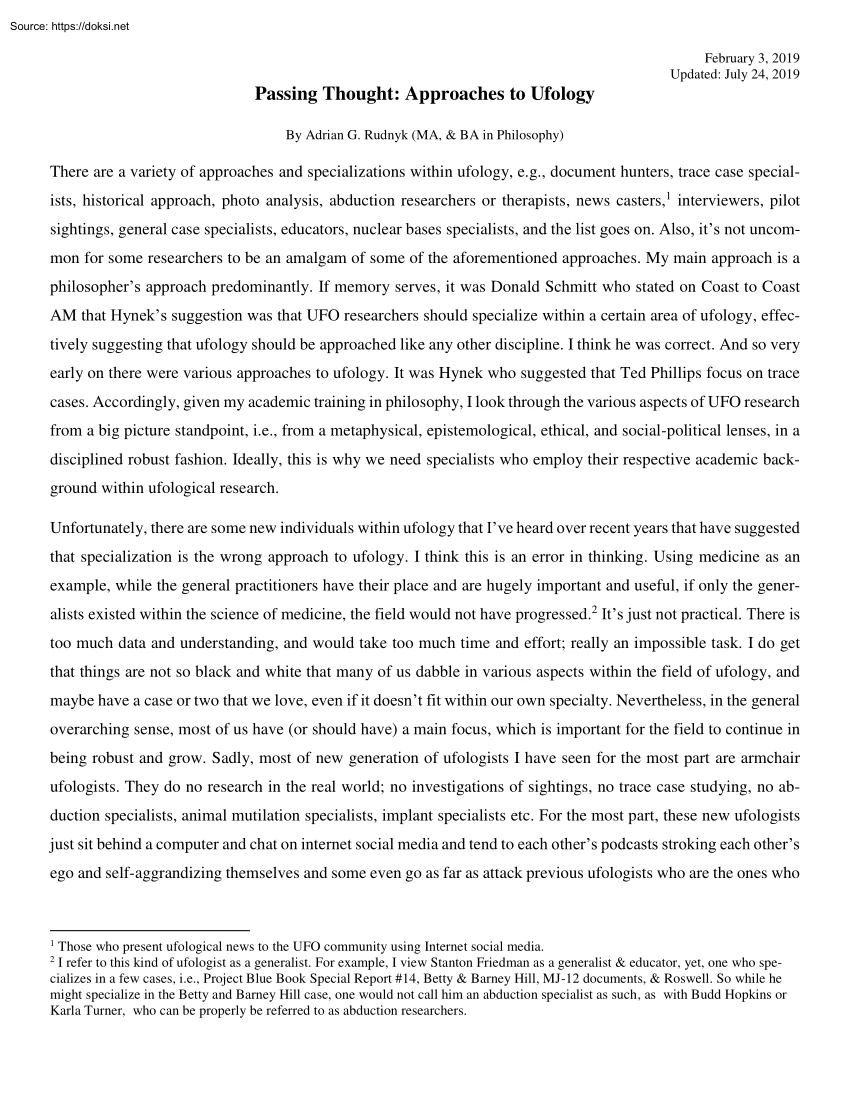
A doksi online olvasásához kérlek jelentkezz be!
Nincs még értékelés. Legyél Te az első!
Mit olvastak a többiek, ha ezzel végeztek?
Tartalmi kivonat
February 3, 2019 Updated: July 24, 2019 Passing Thought: Approaches to Ufology By Adrian G. Rudnyk (MA, & BA in Philosophy) There are a variety of approaches and specializations within ufology, e.g, document hunters, trace case specialists, historical approach, photo analysis, abduction researchers or therapists, news casters,1 interviewers, pilot sightings, general case specialists, educators, nuclear bases specialists, and the list goes on. Also, it’s not uncommon for some researchers to be an amalgam of some of the aforementioned approaches My main approach is a philosopher’s approach predominantly. If memory serves, it was Donald Schmitt who stated on Coast to Coast AM that Hynek’s suggestion was that UFO researchers should specialize within a certain area of ufology, effectively suggesting that ufology should be approached like any other discipline. I think he was correct And so very early on there were various approaches to ufology. It was Hynek who suggested that Ted
Phillips focus on trace cases. Accordingly, given my academic training in philosophy, I look through the various aspects of UFO research from a big picture standpoint, i.e, from a metaphysical, epistemological, ethical, and social-political lenses, in a disciplined robust fashion. Ideally, this is why we need specialists who employ their respective academic background within ufological research Unfortunately, there are some new individuals within ufology that I’ve heard over recent years that have suggested that specialization is the wrong approach to ufology. I think this is an error in thinking Using medicine as an example, while the general practitioners have their place and are hugely important and useful, if only the generalists existed within the science of medicine, the field would not have progressed.2 It’s just not practical There is too much data and understanding, and would take too much time and effort; really an impossible task. I do get that things are not so black
and white that many of us dabble in various aspects within the field of ufology, and maybe have a case or two that we love, even if it doesn’t fit within our own specialty. Nevertheless, in the general overarching sense, most of us have (or should have) a main focus, which is important for the field to continue in being robust and grow. Sadly, most of new generation of ufologists I have seen for the most part are armchair ufologists. They do no research in the real world; no investigations of sightings, no trace case studying, no abduction specialists, animal mutilation specialists, implant specialists etc For the most part, these new ufologists just sit behind a computer and chat on internet social media and tend to each other’s podcasts stroking each other’s ego and self-aggrandizing themselves and some even go as far as attack previous ufologists who are the ones who 1 Those who present ufological news to the UFO community using Internet social media. I refer to this kind of
ufologist as a generalist. For example, I view Stanton Friedman as a generalist & educator, yet, one who specializes in a few cases, ie, Project Blue Book Special Report #14, Betty & Barney Hill, MJ-12 documents, & Roswell So while he might specialize in the Betty and Barney Hill case, one would not call him an abduction specialist as such, as with Budd Hopkins or Karla Turner, who can be properly be referred to as abduction researchers. 2 kept the flame alive and did the best they could under terrible circumstances. Admittedly and sadly, there too are some of the older researchers alive today who self-aggrandize themselves as well and ignore someone like me who is well educated and approaches ufology an academically disciplined fashion. Ironically, I have been in this field just as long and in some cases quite a bit longer than some of these older and more popular ufologists. The difference is that I didn’t decide to come out in such a public fashion until roughly 9
years ago, even though I have been into ufology since I was a young boy in the 1970s and more seriously since the mid-1980s. There is too much ego and self-aggrandizing and not enough true collaborative research among credible robust researchers involved. Overall, besides the fine work that TTSA is doing, I see no new cases or real original thoughts being put forward. The discussions I hear are ones I’ve been hearing for decades Don’t get me wrong, I am not saying there are no good and smart people out there for I have interacted with some of them, but I am only making a general point as to the difference of how research is done now than in the past. Overall, in the past, putting aside the freaks who are prevalent even now, there were many good robust researchers who specialized in certain areas within ufology, and now for the most part, that is not just there. TTSA is doing great research But it’s important to note that the founder of TTSA, i.e, Tom DeLonge, has been a ufologist
since the mid-1990s, and is no newbie He of course employing old school ufology in the sense that he is actively “out there” investigating, and not just an armchair ufologist sitting in from of the computer screen providing social commentary about ufology. There is value in spending time on the internet doing ufologyno doubt about that. My issue is that it is in the extreme now to the point of neglecting the outside world. All I see for the most part is quasi-critical theorists within social media and or release of books by these new so called UFO researchers who only provide critiques of other people’s works or the state of ufology. There is value in this My issue is, that is all I see I too am actively investigating some new real world cases, which I hope in the near future be able to discuss them. Ufology is much more exciting and tangible when one is in the real world discussing and privately researching actual sightings or abduction cases. I do just that Recently, one of the
cases I am heavily involved in is now public knowledge, i.e, the case of my brother a former NASA employee and his extraordinary sighting But even within that context I do my best to employ my academic philosophical training. Science is not enough in dealing with the UFO phenomenon. We need a whole host of various disciplines involved My initial motivation for my ebook, The Assessment; is a strategy of trying to predict and understand what overarching behavior and attitude one should reasonably expect from an alien civilization despite what their psychology or culture might be. If they are living creatures, then certain reasonable assumptions can be made. My book is hugely important and constructive For me, my own book has illuminated certain hidden mysteries about the behavior of the aliens The whole point of my ebook is not to provide definitive answers, but to provide a constructive backdrop. Even if aliens are something other than extraterrestrials, my ebook still provides a
constructive backdrop for any discussion on the nature of an alien civilization no matter where they are from. In the past both Hynek and Mack stated the importance of philosophers. I hope that I have lived up to their expectations I endeavor to always improve
Phillips focus on trace cases. Accordingly, given my academic training in philosophy, I look through the various aspects of UFO research from a big picture standpoint, i.e, from a metaphysical, epistemological, ethical, and social-political lenses, in a disciplined robust fashion. Ideally, this is why we need specialists who employ their respective academic background within ufological research Unfortunately, there are some new individuals within ufology that I’ve heard over recent years that have suggested that specialization is the wrong approach to ufology. I think this is an error in thinking Using medicine as an example, while the general practitioners have their place and are hugely important and useful, if only the generalists existed within the science of medicine, the field would not have progressed.2 It’s just not practical There is too much data and understanding, and would take too much time and effort; really an impossible task. I do get that things are not so black
and white that many of us dabble in various aspects within the field of ufology, and maybe have a case or two that we love, even if it doesn’t fit within our own specialty. Nevertheless, in the general overarching sense, most of us have (or should have) a main focus, which is important for the field to continue in being robust and grow. Sadly, most of new generation of ufologists I have seen for the most part are armchair ufologists. They do no research in the real world; no investigations of sightings, no trace case studying, no abduction specialists, animal mutilation specialists, implant specialists etc For the most part, these new ufologists just sit behind a computer and chat on internet social media and tend to each other’s podcasts stroking each other’s ego and self-aggrandizing themselves and some even go as far as attack previous ufologists who are the ones who 1 Those who present ufological news to the UFO community using Internet social media. I refer to this kind of
ufologist as a generalist. For example, I view Stanton Friedman as a generalist & educator, yet, one who specializes in a few cases, ie, Project Blue Book Special Report #14, Betty & Barney Hill, MJ-12 documents, & Roswell So while he might specialize in the Betty and Barney Hill case, one would not call him an abduction specialist as such, as with Budd Hopkins or Karla Turner, who can be properly be referred to as abduction researchers. 2 kept the flame alive and did the best they could under terrible circumstances. Admittedly and sadly, there too are some of the older researchers alive today who self-aggrandize themselves as well and ignore someone like me who is well educated and approaches ufology an academically disciplined fashion. Ironically, I have been in this field just as long and in some cases quite a bit longer than some of these older and more popular ufologists. The difference is that I didn’t decide to come out in such a public fashion until roughly 9
years ago, even though I have been into ufology since I was a young boy in the 1970s and more seriously since the mid-1980s. There is too much ego and self-aggrandizing and not enough true collaborative research among credible robust researchers involved. Overall, besides the fine work that TTSA is doing, I see no new cases or real original thoughts being put forward. The discussions I hear are ones I’ve been hearing for decades Don’t get me wrong, I am not saying there are no good and smart people out there for I have interacted with some of them, but I am only making a general point as to the difference of how research is done now than in the past. Overall, in the past, putting aside the freaks who are prevalent even now, there were many good robust researchers who specialized in certain areas within ufology, and now for the most part, that is not just there. TTSA is doing great research But it’s important to note that the founder of TTSA, i.e, Tom DeLonge, has been a ufologist
since the mid-1990s, and is no newbie He of course employing old school ufology in the sense that he is actively “out there” investigating, and not just an armchair ufologist sitting in from of the computer screen providing social commentary about ufology. There is value in spending time on the internet doing ufologyno doubt about that. My issue is that it is in the extreme now to the point of neglecting the outside world. All I see for the most part is quasi-critical theorists within social media and or release of books by these new so called UFO researchers who only provide critiques of other people’s works or the state of ufology. There is value in this My issue is, that is all I see I too am actively investigating some new real world cases, which I hope in the near future be able to discuss them. Ufology is much more exciting and tangible when one is in the real world discussing and privately researching actual sightings or abduction cases. I do just that Recently, one of the
cases I am heavily involved in is now public knowledge, i.e, the case of my brother a former NASA employee and his extraordinary sighting But even within that context I do my best to employ my academic philosophical training. Science is not enough in dealing with the UFO phenomenon. We need a whole host of various disciplines involved My initial motivation for my ebook, The Assessment; is a strategy of trying to predict and understand what overarching behavior and attitude one should reasonably expect from an alien civilization despite what their psychology or culture might be. If they are living creatures, then certain reasonable assumptions can be made. My book is hugely important and constructive For me, my own book has illuminated certain hidden mysteries about the behavior of the aliens The whole point of my ebook is not to provide definitive answers, but to provide a constructive backdrop. Even if aliens are something other than extraterrestrials, my ebook still provides a
constructive backdrop for any discussion on the nature of an alien civilization no matter where they are from. In the past both Hynek and Mack stated the importance of philosophers. I hope that I have lived up to their expectations I endeavor to always improve
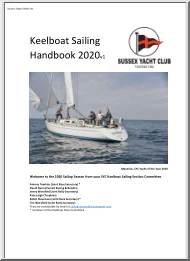
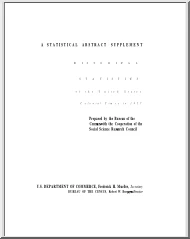
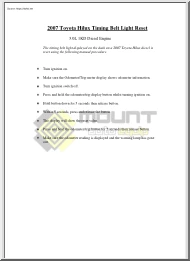
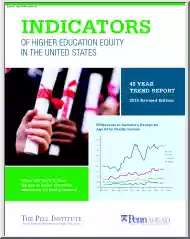
 Ahogy közeledik a történelem érettségi, sokan döbbennek rá, hogy nem készültek fel eléggé az esszéírás feladatra. Módszertani útmutatónkban kitérünk a történet térbeli és időbeli elhelyezésére, a források elemzésére és az eseményeket alakító tényezőkre is.
Ahogy közeledik a történelem érettségi, sokan döbbennek rá, hogy nem készültek fel eléggé az esszéírás feladatra. Módszertani útmutatónkban kitérünk a történet térbeli és időbeli elhelyezésére, a források elemzésére és az eseményeket alakító tényezőkre is.